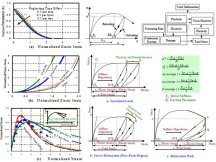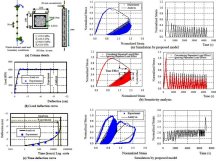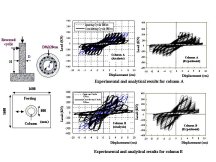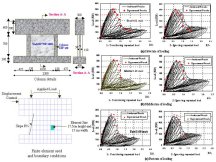Time Dependency in Compression Softening Range and Advancement of Reated Loading Effect of Concrete
Created in Japanese on 3rd July 2004.
Translated into English on 10th August 2004.
Constitutive models of reinforced concrete correspond to high speed loading and middle-low speed loading for experiment at laboratory level, and users had been able to choose according to an analytical target. In this upgrade, the newly developed constitutive model which can respond to arbitrary strain rate was introduced1)Å`4). Although it is known in seismic analysis that strain rate effect is not remarkable up to the maximum capacity, in the post-peak range after the maximum capacity, strain rate affects the load displacement relationship very well. In post-peak analyses to date, neither high speed plasticity nor high speed damage of material was treated strictly, and they were not necessarily general. By this development, the upswing in reliability after the maximum capacity was achieved. The analysis cases in highly inelastic range are published below2).
 Å@ Å@

 Å@ Å@
 Å@ Å@
Pictures expanded when clicked.
Moreover, low cycle fatigue can be strictly taken into account now by time dependency in highly inelastic range having come to be treated. If repeated loading is given in highly inelastic range, deformation and capacity will change seemingly as if it was influenced of the repeat. However, in this nonlinearity, the time effect is also contained together. This time effect will be strictly treated by this improvement, and it became possible to extract the influence of repeat truly. Consequently, the analysis accuracy of response characterictic of RC which receives loading with quite much number of times of a repeat was able to be raised more than before. In addition, since the model was developed so that it could respond also to high cycle fatigue at middle stress region, it became possible simultaneously to analyze the delayed fracture of a member which receives long time loading.
"Journal of Advanced Concrete Technology" in References below is English Academic Journal published by Japan Concrete Institute.
References
| 1) |
Khaled Farouk El-Kashif and Koichi Maekawa : Time-Dependent Nonlinearity of Compression Softening in Concrete, Journal of Advanced Concrete Technology, Vol. 2, No. 2, pp.233-248, 2004. |
|
| 2) |
Koichi Maekawa and Khaled Farouk El-Kashif : Cyclic Cumulative Damaging of Reinforced Concrete in Post-Peak Regions, Journal of Advanced Concrete Technology, Vol. 2, No. 2, pp.257-271, 2004. |
|
| 3) |
Khaled Farouk El-Kashif : Time-Dependent Compressive Deformation of Concrete and Post-Peak Structural Softening, Ph.D Dissertation, University of Tokyo, 2003. |
|
| 4) |
Khaled Farouk El-Kashif and Koichi Maekawa : Time-Dependent Post-Peak Softening of RC Members in Flexure, Journal of Advanced Concrete Technology, Vol. 2, No. 3, pp.301-315, 2004. |
Close
|